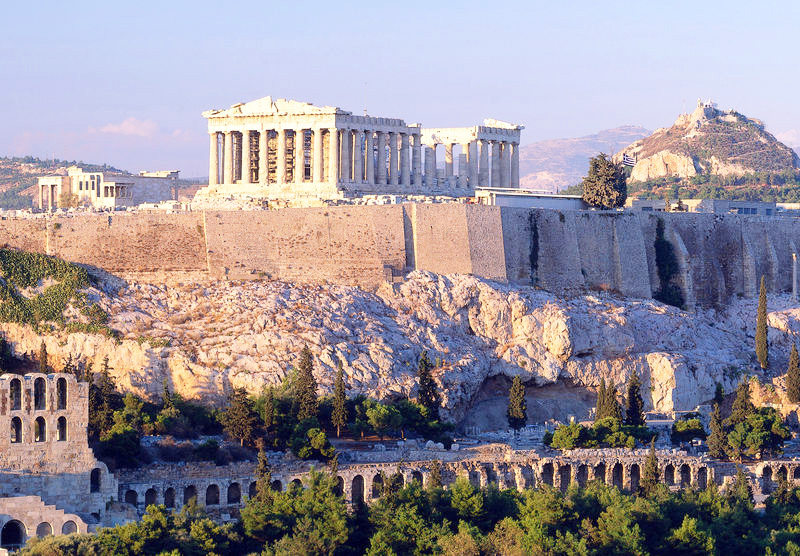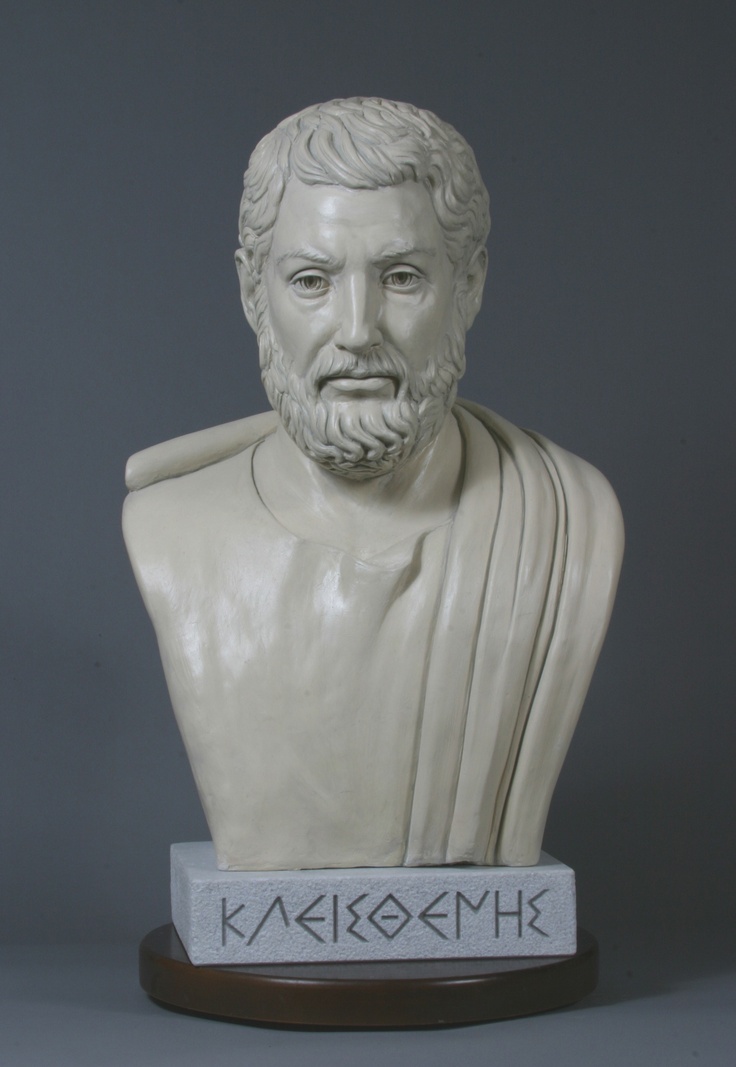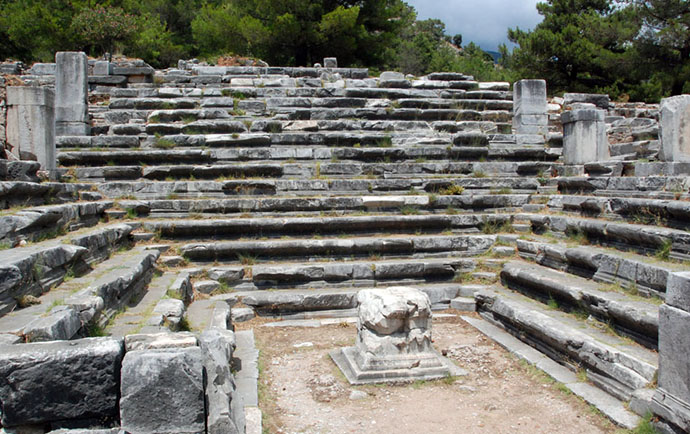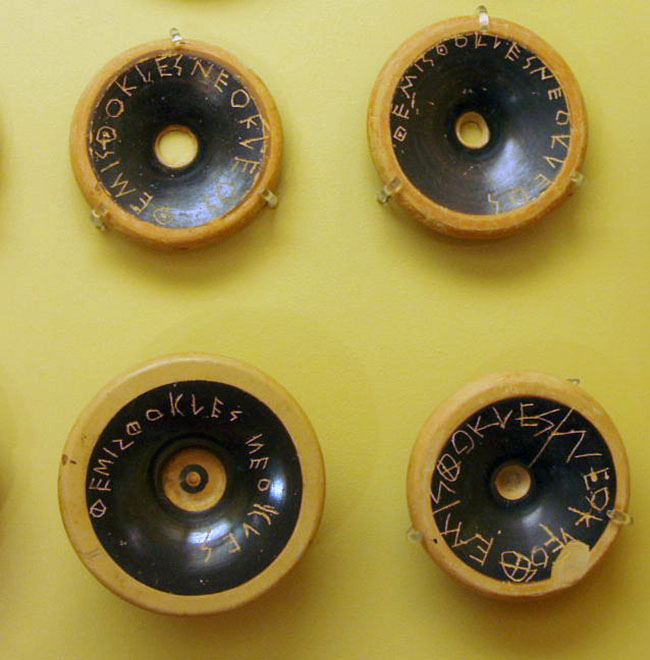Peisistratos (Pisistratus)– after the departure of Solon from Athens, the political struggle was continued. For the government in Athens fought three parties: the party of population living along the coast led by Megacles, on the plains led by Lycurgus and party of highlanders led by Pisistratus. On the seasides were for Solon reforms, on the plains were for the oligarchy, and the highlanders were against the reforms of Solon and soughted radical changes. Highlanders were taken advantage of by Pisistrate to take power by force in Athens and to introduce tyrannies.
Pisistrate was the son of Hippocrates from a noble lineage Phalerum (Phaleron), leader of the aristocrats (fraction Hyperakrioi). In 561 BC. he had with the highlanders from Hyperakrioi and other supporters taken the Acropolis and became a tyrant of Athens. He made an alliance with Megacles (Alcmaeonidae representative and leader of coast-dwellers), who was later sent into exile. Pisistrate after 10 years with the help of the army (the Thebans and Argos) returned to Athens and completely defeated the opponents and became the ruler of Athens.



When for the second time he got the power he became cautious. He did not repealed or changed Solon’s reforms. He used the law limits of individual land holdings with a aim to divide surplus large estates to poor farmers. For the Athens traders and craftsmen he ensured wide trading, thanks to the wise diplomatic moves. He edited the Athenian finances and minted money. He also arranged the port Phalerum, that strengthened the position of Athens at the sea. He rebuilt the army, that consisted of the city’s military and mercenaries. Thanks to him, the economic power of the aristocrats moved to traders and craftsmen. The wealth of the country had increased, so he introduced a levy on the revenues to 10 percent. He made Athens a more beautiful and luxurious programmed by public works (control of city streets, increased urban water supply, set of the monumental fountain, built a temple on the Acropolis Hekatonpedon, in the lower part of town laid the foundations of Olympieion). He commissioned the permanent copying and archiving of Homer’s two epic poems, the Iliad and the Odyssey.
Pisistratus died in 528 BC. and were inherited by sons Hippias and Hipparchus. Hippias performed major state affairs, and Hipparchus was in charge of religious celebrations and cultural events. 514 BC. opponents of tyrannies during the Panathenaic Festival killed Hipparchus (Harmodius and Aristogeiton – the killers). Hippias after the murder plot became more suspicious and harsher: he executed many suspected persons, strengthened the guard and did not hide sympathies to Persia. His opponents have asked the help of the Sparta, they had 2 inflammation in Attica. The first time the Spartans were rejected, while the second time they entered the Athens and surrounded the Hippias at the Acropolis. Hippias surrendered and 510 BC was banished from the city and had retreated to Sigeu on the Hellespont. That was the overthrown of the tyrannies in Athens.



Cleisthenes (the father of Athenian democracy). After the fall of Pisistratids and abolishing tyrannies, a political struggle re-started between Hippias supporters, the oligarchs and democrats. Democrats (seafolk and Highlanders) led by eupatridae Cleisthenes (the son of Megacles, a member of Alcmaeonidae). He had several times tried tyrannies, but he managed it only with the help of the Spartans. After the fall of tyrannies he came into conflict with Isagoros (leader of oligarchs, had the support of the Spartans) and Cleisthenes exiled. When the people revolted against the Isagoras (Council had not acknowledged oligarchy, the people detained him on the Acropolis, where he surrendered after 3 days), Cleisthenes returned to Athens and continued to reform democratic type.
Cleisthenes wanted to abolish the remnants of old family groups of 4 tribes and shared Attica to 10 phyles, trying to get people to bond together. The tribes were named after heroes and names selected Pythia from a list of 100 names. He divided the country into demes (30 districts, trittyes): 10 around the city, 10 on the coast and 10 inland. Each tribe named after one deme in each region. Cleisthenes then ordered that all who lived in the same deme were citizens by deme (and because of that the official data with the name of the citizen, signified also the affiliation of deme). According to 10 phyles, army was divided into 10 assemblies, each with one strategist at the front, led by polemarch.



According to phyles he established a new council of 500 members (Boule – council of citizens) with 50 members from each phyle. Members were given by lot of all people aged after 30 years. No one could be elected twice in a row, or more than 2 times. Boule ensured continuity – 50 members of the boule of the same phyle were served as prytaneis in shifts of 36 days. So every phyle ruled state by a tenth year. Members of prytanes were met in tholos (circular building next Bouleuterion in Agoras). One third of the 50 prytaneis always had to be present in tholos, or attend meetings. Tholos was a real center of executive power, as well as residences. Every day from 50 prytaneis chose ephesus, president of the day was President of Prytaneion, boule and Ecclesial that were summoned that day. Bullets had to take an oath: to bind themselves to fulfill their duties respecting the laws by making others to respect it and the good of the people, to keep the secret about what they did and learn and to respect the freedom of citizens. They had immunity. Over the years they were released of military service. At the end of the mandate each boule should present to the people of the assembly a report on the work. If there was irregularities identified, the members of Boule could be be individually processed.
Cleisthenes moved Ecclesial from the Agora to the The Pnyx hill, that faced the Acropolis. The ecclesia or ekklesia was the general Assembly of full citizenship (National Assembly). Ekklesia, by the law should held meetings four times during the prytaneis mandate, but could be convened whenever the boule or the strategists considered it was necessary.



In order to save Athens from tyranny, Cleisthenes introduced ostracism. Every year the boule should be included on the agenda of parliamentary sittings the question to the people whether they thought someone to be dangerous. It took at least 6,000 votes for the required majority of ostracism. If the most was reached at Agoras citizens came prepared with the name of the person to be considered as dangerous. At the gate of the Agora (Agora would distanced itself and would have 10 entrances for each phyle) there would be standing magistrates and received the tiles while the citizens remained within the Agoras by the end of the vote to avoid double voting. Any advertising was prohibited. After the vote, tiles were counted, and if there were less than 6,000 votes, the voting had to be overturned. If there was a sufficient number of plates (tiles), the person who received the most votes would be expelled. After the end of counting of tiles (Ostrac) were amounted from the Agoras and burried in the pit side of the road or to it was used to patch the road.
